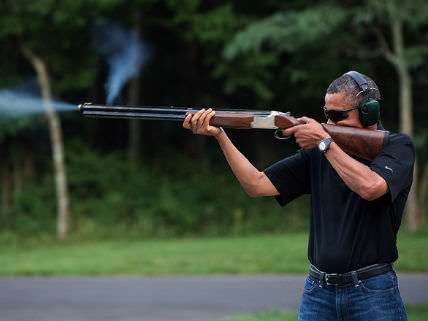Yes, the Second Amendment Protects Individual Rights
What The New Yorker gets wrong about guns and the Constitution.

In 2008 the U.S. Supreme Court recognized what numerous historians and legal scholars have been saying for many decades: Namely, that the Second Amendment to the U.S. Constitution secures an individual right—not a collective one—to keep and bear arms. Yet despite this widespread legal and academic consensus, certain gun control advocates still insist on behaving as if the Second Amendment does not mean what it says.
The latest example of such regrettable behavior comes from liberal New Yorker pundit Adam Gopnik, who claims that a vast and intrusive gun control regime can happen here in the United States because the U.S. Constitution protects no such thing as an individual right to possess guns. Nothing in the Constitution, he asserts, "limits our ability to control the number and kinds of guns in private hands." The only reason so many people think otherwise, Gopnik says, is because they've been hoodwinked by the "radical" and "tortured" interpretation of the Second Amendment put forward by "right wing" Justice Antonin Scalia in his "younger-than-springtime decision D.C. v. Heller, in 2008."
For a freshly minted piece of "right wing" radicalism, the individual-rights interpretation of the Second Amendment sure has a lengthy and long-running list of distinguished liberal supporters, including some of the biggest names in legal academia. For example, there is University of Texas law professor Sanford Levinson, a leading liberal scholar, who published an essay in the prestigious Yale Law Journal back in 1989 titled "The Embarrassing Second Amendment." As I explain in my recent book Overruled:
The embarrassment, Levinson argued, came from the legal left's refusal to take the Second Amendment seriously. "I cannot help but suspect that the best explanation for the absence of the Second Amendment from the legal consciousness of the elite bar," he wrote, "is derived from a mixture of sheer opposition to the idea of private ownership of guns and the perhaps subconscious fear that altogether plausible, and perhaps even 'winning' interpretations would present real hurdles to those of us supporting prohibitory regulation."
Eleven years later, Harvard law professor Laurence Tribe, a respected scholar and teacher whose former students include a young Barack Obama, amended the new third addition of his legal treatise American Constitutional Law to officially endorse the individual-right interpretation of the Second Amendment. This was a marked change from the two previous editions, where Tribe had accepted the collective-right view. "My conclusion came as something of a surprise to me, and an unwelcome surprise," Tribe admitted to the New York Times after the third edition came out. "I have always supported as a matter of policy very comprehensive gun control."
Along similar lines, the Constitutional Accountability Center, a respected liberal think tank and law firm "dedicated to fulfilling the progressive promise of our Constitution's text and history," filed an amicus brief at the Supreme Court in the 2010 gun rights case McDonald v. Chicago. As that brief plainly (and accurately) stated, "the original meaning of the Privileges or Immunities Clause [of the 14th Amendment] protected substantive, fundamental rights against state infringement, including the constitutional right of an individual to keep and bear arms."
In short, there is nothing "radical" or even particularly "right wing" about the well-founded idea that the Constitution secures an individual right to keep and bear arms.


Show Comments (160)